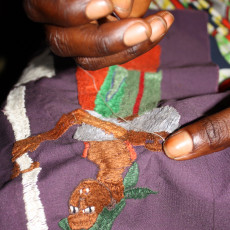In the few days before we left Washington D.C., my colleague, Ned Meerdink and I were met with many questions about the nature of the work of our partner organization, SOS Femmes en Danger (SOS FED) and about the gravity of the sexual violence epidemic in the DRC. In light of those questions, I will use this blog entry to put SOS FED’s work into context.
In the 14 years since the first Congo war, and the 12 since the second, approximately 6 million people have been killed in what has become the deadliest conflict since World War II. Those that survive death contend with another method of warfare: sexual violence. “Sexual violence” encompasses various forms of sexual violations that have been reported in eastern DRC, including gang rape, kidnapping, instrumentation, genital mutilation, and forced marriage; it is often a systematic and strategic way to terrorize civilians and inflict humiliation for women, their husbands and family members. Sexual violence continues to be used as a weapon of war by the national army Forces Armés de la Republic Democratic du Congo (FARDC), re-integrated Congrès National Pour la Défense du Peuple (CNDP), Forces Démocratiques de Libération du Rwanda (FDLR), various militias groups, and even civilians— that is to say that in eastern Congo, sexual violence against women, girls, and sometimes civilian men is ubiquitous. Sexual violence occurs with such frequency that it is difficult to quantify the amount of violations that occur. Moreover, survivors of sexual violence risk being abandoned by their husbands and community if they should acknowledge their attacks. Consequently, many remain quiet, disclosing sexual assault when absolutely necessary. Survivors should do exactly the opposite as they often suffer from psychological trauma and medical conditions such as infertility, fistulas, abdominal, pelvic, and lumbar pain and a variety of sexually transmitted infections, including HIV/AIDS.
SOS FED works in South Kivu, an area heavily affected by fighting and the sexual violence epidemic, with the aim of ameliorating the devastating reality faced by survivors of sexual violence. SOS FED operates three centers located in Mboko, Kikonde and Kazimia villages. The centers are in often inaccessible areas with few roads, and workers must travel between the centers and Uvira (SOS Fed’s headquarters) by motorcycle. In the three project villages, SOS FED has organized Centres d’ecoute (listening centers) for survivors of sexual violence, young mothers caring for children produced by rape, and other women lacking support. The centers act as resources for women to exchange their stories, eat meals together, and generate collective support. For example, behind the Mboko center is a group of community fields, where women cultivate together in an atmosphere of security. In Kikonde, SOS FED concentrates on education programs, ensuring that women and young girls gain their education and allowing them to better protect themselves against violations of their rights. Kikonde is also home to a self-sustaining community field program, which provides income for women housed at the center. In Kazimia, SOS FED concentrates on micro-credit and income generation projects, and has built two centers for knitting and sewing; 73 women are currently involved in the clothing manufacturing program and are active merchants in the area. SOS FED’s work has left an indelible mark on South Kivu’s long-suffering civilian population. Although statistics were not kept until SOS FED had been in operation for over four years, an estimated 1,000 women and girls have been touched by the organization’s work.
Despite notable success, SOS FED’s work is limited by regional and financial hindrances. Instability in the South Kivu province of the DRC persists thanks to the rampant human rights violations committed by various armed groups. Work to support survivors of sexual violence is also limited by the lack of electricity, water, and reliable roads. In spite of Congolese First Lady, Olive Lembe’s, Je Dénonce! campaign to end the sexual violence epidemic, the lack of protection and the open antagonism the Congolese government shows in regards to female human rights workers continues to plague the organization. Given the large scale of the problems SOS FED faces, they need more visibility and a great deal of support both locally and abroad.
Posted By 2010 Fellow
Posted Jul 9th, 2010


